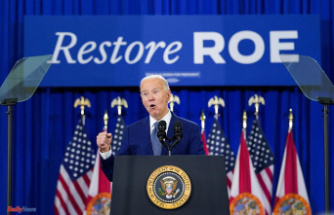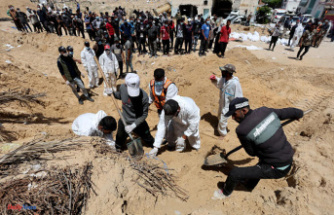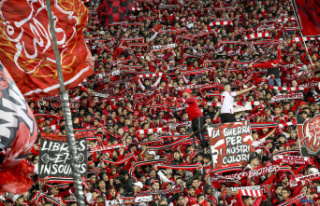At the end of a road, in the middle of the baobabs, a school in the center of Senegal. "Quiet... Action!" The camera slowly pivots on its tripod, fixates on the lead actor. The film crew hold their breath. "Cut!" »
" It's perfect ! “Launches director Leila Sy, who is shooting Banlieusard 2, the sequel to the first part with French rapper Kery James headlining. The release is scheduled in a few months on Netflix. Assistants, technicians, actors… everyone blows. It's the last day of filming, the fatigue can be read on the faces and the lunch break is welcome. This afternoon, chicken yassa, a traditional dish.
The American giant is making its mark in French-speaking West Africa. After a long sluggishness, the region is seeing its audiovisual production explode, driven by Senegal and Côte d'Ivoire. “The light makes all the difference. I find everything beautiful, the color, the people, the energy,” marvels Leila Sy. "The teams are there, the skills are there, Senegal is in the process of repositioning itself in this ecosystem and offers this possibility to international producers to come and develop projects without worries", rejoices Ousmane Fall, co-producer for the Senegalese part of the film. .
hit soaps
In a cramped room of a clinic in Dakar, another group, much smaller but motivated, is busy finishing the next episode of the Karma series broadcast locally on the TFM channel. The whole team learned the trade on the job.
Souleymane Camara, 29, touches everything. Interpreter in the series, he dreams of going behind the camera, "it's by doing that I learn," he says. He works for Marodi, the spearhead of Senegalese and West African series production. Launched in 2015, the company first specialized in digital before migrating to the YouTube platform, where it has more than 4.8 million subscribers and claims more than 20 million views each month.
Its business model is based on its local content and advertising spots that generate millions of views. Its clientele is 56% female and 70% aged 18-34. Its partnerships with Senegalese TV channels and international distributors such as Canal and Amazon Prime ensure high visibility, as for the hit series Mistress of a married man.
"Marodi's ambition is to be a content producer for all of Africa and the diaspora," Julia Cabrita Diatta, sales and marketing director, told AFP. Today, 60% of its consumers are in Senegal, 20% elsewhere in Africa, 8% in France. "We observe in French-speaking Africa a take-off of production in quantity, driven by Senegal and Côte d'Ivoire, and budgets which have increased enormously", explains Pierre Barrot, audiovisual program manager at the International Organization of La Francophonie (OIF).
Thus, series in 52-minute format have gone from a dozen episodes in twenty-five years (1992-2017) to around a hundred episodes in five years (2018-2022), driven mainly by Canal and TV5 Monde, which provide regional distribution.
This format remains less seen locally than the 26-minute classics, most often sentimental-family soap operas (the triptych polygamy-adultery, inheritance and witchcraft) or police comedies. Canal launched its first daily series in French-speaking Africa in September 2022, The future is ours, which chronicles the lives of several families in a neighborhood of Abidjan.
New generation
Beyond series, French-speaking Africa, unlike Nigeria, the continent's leading cinematographic power (Nollywood), produces very few television films and quite a few cinema films, but the production of popular comedies could accelerate with the reappearance of a network of cinemas, as in Dakar and Abidjan, estimates Mr. Barrot, of the OIF.
With 56,652 paying admissions in twelve countries, the film Les Trois Lascars by Burkinabé Boubakar Diallo, distributed by Canal , became in early 2022 the biggest theatrical success of this beginning of the century in French-speaking Africa, according to the OIF.
A figure, however, minimal compared to the successes of the 1990s when Buud Yam, by Gaston Kaboré, had reached 500,000 admissions in 1997. This was before the cinema, once very popular, experienced a spectacular decline in the 2000s, marked by the disappearance of almost all cinemas in French-speaking Africa.
A new generation is emerging today. The Kourtrajmé school opened its doors in Dakar in 2022 to train screenwriters and directors and meet the demand of the sector. The students of the first class finish their course, confident in the future. "We've never had so many series. In time, it will go even further. Personally, I am very positive. There are a lot of opportunities that will come,” thinks Kenza Madeira, 23, who wants to find her balance between acting and directing.












